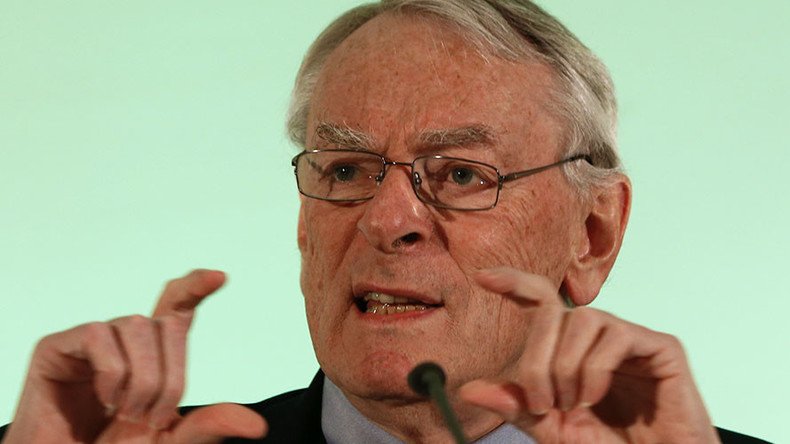Russia may be banned from sending track & field athletes to Rio Games – WADA commission chief

The head of the World Anti-Doping Agency’s (WADA) independent commission said on Wednesday there are ongoing doping problems in Russia, and that as a result Russian track and field athletes may be unable to take part in the 2016 Rio de Janeiro Olympic Games.
"My guess is Russia may not make it back for Rio. The IAAF and WADA are not going to risk their reputations by rolling over and playing dead," Pound said.
Dick Pound: as we have seen from WADA strong response to latest German documentary, not enough is changing in Russia to re-comply
— WADA (@wada_ama) March 9, 2016
The scandal over doping was fuelled by the explosive news on Tuesday that Russian tennis star Maria Sharapova failed a drug test at the Australian Open. She admitted to testing positive for meldonium, which was only added to WADA’s list of prohibited substances in early January.
Dick Pound, who was in charge of an independent review that has recommended that the All-Russia Athletics Federation (ARAF) be banned from the sport for “systemic doping,” said on Tuesday the five-times Grand Slam winner was “reckless beyond description” and made “a big mistake.”
Sharapova failed drug test, says it 'was huge mistake'At a press conference in Los Angeles, Maria Sharapova admitted, she had been taking the substance called Mildronate (Meldonium) for the past 10 years, and that it only became illegal on 1 January 2016. ‘I don’t want to end my career this way. And I really hope that I will be given another chance to play this game. I made a huge mistake, I let my fans down, I let the sport down.’ Learn more here: http://on.rt.com/76d9
Posted by RT Play on Tuesday, March 8, 2016
Pound’s review report, commissioned last November in the wake of a documentary by German TV channel ARD, claimed the existence of a Russian “shadow lab” designed to filter out athletes’ positive tests. The laboratory allegedly destroyed 1,714 samples shortly before a visit from WADA officials.
The ARAF accepted the doping suspension by the International Association of Athletics Federations (IAAF) without requesting an appeal. The IAAF said at the time that the ARAF fully understood that its membership could be reinstated “if the verification criteria have been fulfilled.”
It was believed the ARAF took the decision not to appeal against the suspension as it expected that a review by the IAAF inspection team in early 2016 could prompt the lifting of the ban and clear the way for Russian athletes to participate at the Rio Olympics.
#Russian athletes may miss #Rio#Olympics after #doping suspension accepted https://t.co/H4LjSnsLQ1pic.twitter.com/7niUcrujah
— RT Sport (@rtsportnews) November 27, 2015
The initial documentary by German freelance journalist Hans Seppelt, aired by ARD in December 2014, involved Russian whistleblowers who spoke out about what the film described as a systematic use of doping in athletics and other sports in Russia. Seppelt’s latest documentary, also on the issue of Russian anti-doping policies, appeared on ARD last Sunday.
The Russian sports minister, Vitaly Mutko, dismissed the latest allegations and said the recent documentary had a political agenda, telling TASS that Russia is doing its utmost to combat the use of doping in sports.
Earlier on Wednesday, President Putin’s spokesman Dmitry Peskov told journalists the Kremlin is aware of the new doping allegations against Russian athletes, but urged people not to apply this situation to all sports in Russia.
“Attempts to politicize sports or turn it into a political tool to achieve specific goals are destructive for international sports, [and are] unacceptable and inexcusable,” Peskov stressed.
The Kremlin spokesman added he was confident that the new doping allegations will be thoroughly investigated.
#Rio2016 and #Tokyo2020 Olympic Games face corruption investigation https://t.co/pNIz21n4icpic.twitter.com/ti8q6lkDlG
— RT Sport (@rtsportnews) March 2, 2016
Russia has been battling to make it to the Rio Olympics by massive restructuration of national athletics governing body and tightening control over doping practices.
Shortly after the release of Pound’s probe, Russian president Vladimir Putin has ordered a thorough inquiry into the alleged use of doping among athletes saying that individuals should be held accountable rather than the country being banned as a whole.
A week later, Aleksandr Zhukov, the head of the Russian Olympic Committee (ROC), said Russia will not boycott the 2016 Games because “Russian athletes must compete under the Russian flag” without interference of politics into sports.
Last December, all senior management of the Russian Anti-Doping Agency (RUSADA) have resigned. Prior to that, RUSADA amended its charter to establish a supervisory board designed to monitor its activities and guarantee its impartiality.












